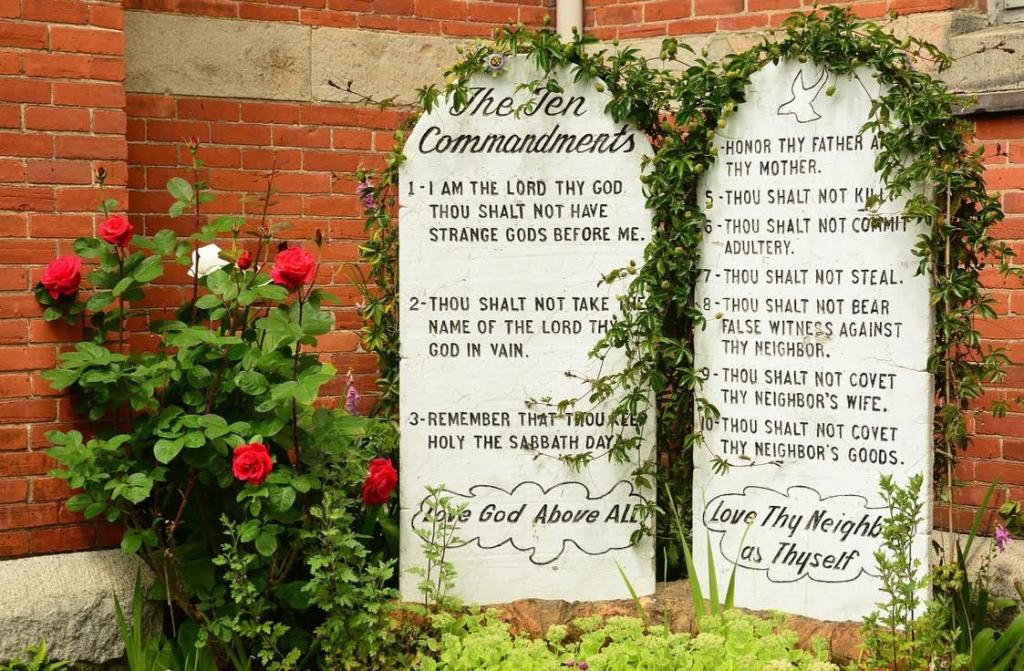
Here’s What’s Happening in Louisiana & Oklahoma
Louisiana and Oklahoma are stepping away from religious freedom in America and taking their citizens with them. Can the nation be far behind? And is it a positive step or a dangerous movement?
Louisiana recently passed a law requiring all public schools to display the 10 commandments in their classrooms. Meanwhile, Oklahoma’s chief education officer has mandated that public schools teach the Bible in all grades beginning with the fifth grade.
That’s fine as long as other religions have the right and opportunity to post their core beliefs alongside the 10 Commandments. I’m a lifelong Christian who expects to keep my faith as long as I live.
I would love to see church pews filled with Christians who truly want to live by Christ’s teachings. I would like to see Christians’ faith play out in people’s everyday lives.
But… I’m also an American who believes the U.S. Constitution is one of the best ways ever instituted to govern a country. I don’t want to see right-wing radicals make a mockery of it by trampling on Americans’ religious freedom.
Our freedom to worship as we please should be as important as our right to carry a gun. The founding fathers thought so. They mentioned religious freedom first among all the rights they gave us in the Bill of Rights – the first right in the First Amendment. That should tell thoughtful people something of importance.
It’s sad that some Americans value guns to an unreasonable level and shoot down, so to speak, proposed laws to reduce gun violence. Yet, many of these same Americans attack our religious freedom in the name of Christ, who never forced his teachings on anyone.
Government Shall Make No Law….
There are several problems with the new school requirements in Louisiana and Oklahoma. The most obvious one is they are unconstitutional. In the United States, no government can mandate the teaching of any religion to students in public schools – at least for the moment.
The First Amendment clearly says Congress shall make no law respecting an establishment of religion, or prohibiting the free exercise thereof, or abridging the freedom of speech, or of the press, or the right of people peaceably to assemble and to petition the Government for a redress of grievances.
Parents who want their children to receive a religious education need to send their children to private religious schools, take them to church regularly, teach them Christian principles in the home and involve them in Christian activities with other Christians.
Louisiana’s New Law
Louisiana’s new law requires that all state-funded schools display the 10 commandments in grades K-12 and in state university classrooms. The display must be “a poster or framed document that is at least 11 inches by 14 inches in a large, easily readable font.”
“If you want to respect the rule of law, you’ve got to start from the original lawgiver, which was Moses,” Republican Gov. Jeff Landry said. You also need to start with parents, who generally are the most important role models during children’s formative pre-school years.
Not surprisingly, a group of parents and civil rights organizations filed a challenge to Louisiana’s new law in June, saying it violates the First Amendment and U.S. Supreme Court precedent. Who could possibly think opponents of the requirements wouldn’t sue?
Earlier Supreme Courts have ruled that religious displays in public schools — such as the 10 Commandments posters — are unconstitutional. No doubt the state of Louisiana thinks the current Supreme Court will rule differently, which it may well do.
Edict in Oklahoma
In Oklahoma, state Superintendent of Education Ryan Walters announced that public schools must incorporate the Bible into lessons for grades 5-12. “Every teacher, every classroom in the state will have a Bible,” he has been quoted as saying.
“Adherence to this mandate is compulsory. Further instructions for monitoring and reporting on this implementation for the 2024/25 school year. Immediate and strict compliance is expected,” he added.
So, he’s not only mandating the poster and font sizes, he’s also planning to spy on teachers to ensure they have the 10 Commandments in their classrooms. How draconian of him.
Walters insisted that without “basic knowledge” of the Bible, Oklahoma students would be unable to “properly contextualize the foundation of our nation….” Teachers who don’t comply with his mandate could lose their teaching licenses.
How arrogant!
Now, take out the word “Bible” out of Walters’ statement and substitute the word “Quran.” Christian Americans across the country would be up in arms if Muslims tried to do what conservative Christians are trying to do in public schools. They probably wouldn’t be any happier if the Torah were taught instead of the New Testament either.
The Core of Religious Freedom
The Louisiana law “strikes at the core of religious freedom,” said the executive director of ACLU Louisiana, Alanah Odoms. Several parents represented in the lawsuit called the new law “unconstitutional,” “divisive,” “a gross intrusion of civil authority into matters of faith” and “un-American.”
Proponents argued that the new law isn’t solely religious because the 10 Commandments are “foundational documents of our state and national government.” They are correct to a certain extent, although the U.S. Constitution doesn’t mention God or Christ except to say “the year of our Lord,” which was a common phrase at the time.
“The worry has always been that if the government starts to take sides in promulgating religious truth, that will create divisiveness and conflict,” Richard Schragger, a professor at the University of Virginia School of Law recently told ABC News. “And there was ample proof of that, that the founders were quite aware of, particularly Protestant Catholic conflict in Europe.”
Many of the conflicts were on the minds of our founding fathers (Read “Religion and the Founding of the American Republic here) Some examples:
- The Eighty Years’ War (1568-1648) was an armed conflict over religious and political issues in the Netherlands.
- French Wars of Religion (1562-1598) had several causes, as wars tend to do, and one of those causes was the rise of Protestantism in a Catholic country.
- Thirty Years’ War (1618-1648) was one of several conflicts between Catholics and Protestants in Europe.
Thinking for Themselves
The Oklahoma Attorney General’s office has said the state superintendent has no legal authority to issue the mandate he issued. The Oklahoma Education Association, which includes educators, administrators and other school employees, called the mandate “indoctrination.”
Walters has argued that the Bible is “one of the most historically significant books and a cornerstone of Western civilization, along with the Ten Commandments.
“They will be referenced as an appropriate study of history, civilization, ethics, comparative religion, or the like, as well as for their substantial influence on our nation’s founders and the foundational principles of our Constitution,” he said.
Will public school students be given opportunities to question what they are taught? Will they be allowed to think for themselves? Will they be allowed to disagree?
The Faith of Our Fathers
Walters mentioned “our nation’s founders” in talking about the Bible. The founding fathers I’ve studied for decades as a history lover certainly knew how to think for themselves. And they were hardly devout Christians.
Dr. Gregg Frazier, professor of history and political studies, points out that they were a diverse group. “…the key Founders who were most responsible for the founding documents (Declaration of Independence and Constitution) and who had the most influence were theistic rationalists.
Some of the “more prominent Founders meant something different by the word ‘Christianity’ than do 21st-century evangelical Christians,” he said. “Consequently, it is not appropriate or intellectually honest to quote their uses of the word to audiences today without explaining that they meant a system of moral teachings and not orthodox biblical Christianity.”
It is inaccurate and misleading to put all founding fathers into one of two groups – the deists or the Christians, Frazier said. A number of them were theistic rationalists. As such, they tended to…
- Believe in a powerful and rational God
- Think nearly all religions promote morality
- Reject the deity of Christ
- Reject the Trinity
- Dismiss the idea of original sin
- Reject the existence of eternal punishment
- Reject the idea that God inspired scripture.
In fact, Thomas Jefferson created his own Bible by cutting and pasting. He removed all of Christ’s miracles and most references to the supernatural in his version, including the resurrection and sections that portray Jesus as divine.
“The notion – that our country’s roots are explicitly Christian – is both foolish and wrong,” according to the Center for American Progress. “In recent years, we have been told by a variety of conservatives that America’s founding fathers established the country under Christian doctrine – that we are a ‘Christian nation’ and should operate accordingly.
“This notion – that our country’s roots are explicitly Christian… devalues the Christian faith and disrespects the genius of our founding fathers,” the center said. “Christianity does not need to be endorsed by law or some fantasized re-interpretation of the Constitution in order to have meaning in people’s lives,” the center said.
“Let’s face it. Will Christianity be seriously jeopardized if its followers learn that only one of the 56 founding fathers was a member of the clergy? Will their faith be dashed if they discover James Madison objected to chaplains opening the proceedings of Congress with a prayer?
The center then asks these questions: “… will people ignore the Bible if the Ten Commandments aren’t posted in courtrooms or if the nativity scene in town squares shares space with a menorah. When people say ‘Happy Holidays’ instead of ‘Merry Christmas’ at Walmart, are they attacking Jesus?
“For Christians secure in their faith, the answer to all these questions should be a resounding ‘no'”
We’ll pick up this look at freedom of religion in my next post.

















